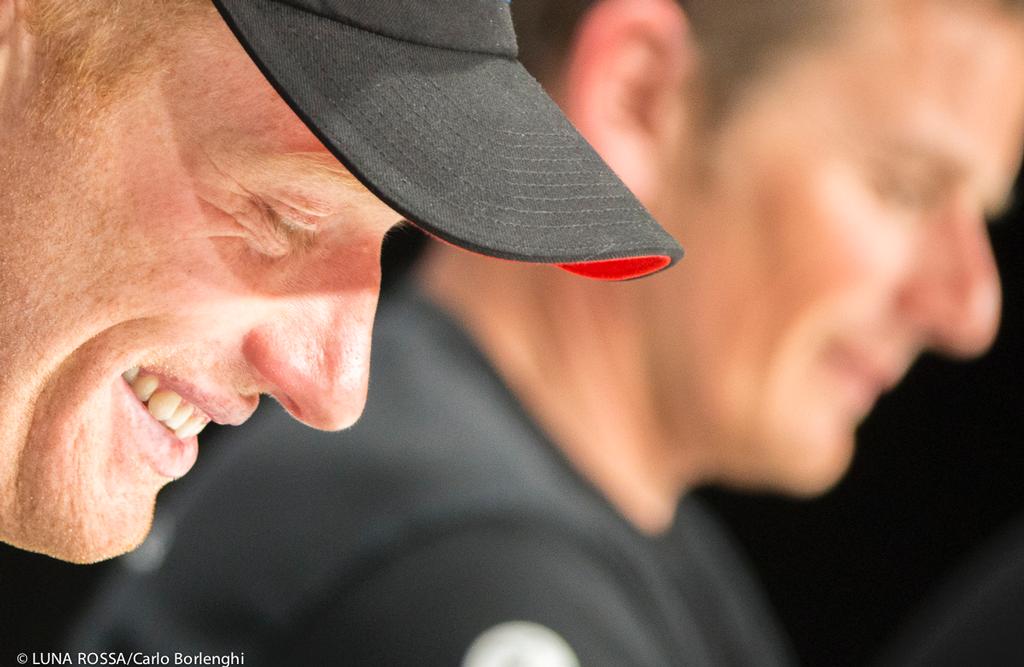AC34 - Spithill drives the biggest juggernaut in America’s Cup history
by David Schmidt, Sail-World USA Editor on 25 Sep 2013

San Francisco
34th AMERICA’S CUP
America’s Cup final
Oracle Team USA skipper James Spithill
Race 16
Photo: © LUNA ROSSA/Carlo Borlenghi Carlo Borlenghi/Luna Rossa
http://www.lunarossachallenge.com
Two days ago I was cautious: Lady Luck had been kind to the boys of Oracle Team USA in their quest to defend the 34th America’s Cup against Emirates Team New Zealand (ETNZ), who have been on match point for some time.
Things felt bleak for the American-flagged team last week. Sure, skipper Jimmy Spithill was confident that he could still win, despite (or maybe because of) an almost comical points deficit; now, however, the entire country believes that winning is just a matter of time.
So how did the wheels come off the Kiwi’s bus? The honest truth is that they didn’t-the Kiwis are sailing just fine, thank you.
Instead, the Americans found a way to turbocharge both their boat and their crew.
Many people (myself included) questioned the soundness of the judgment to remove John Kostecki, one of the most successful tacticians on the planet, in favor of Sir Ben Ainslie, but the swap to the five-time Olympic medalist has made a clear difference, and the back of the boat simply looks like a happier place these days. Sure, it’s easy to smile when you’re winning races, but five back-to-back bullets under match-point pressure is no easy feat.
Changes to the boat are harder to pinpoint from an outside-of-the-team’s-shed perspective, but the rumors are strong that Oracle has made significant modifications throughout this Cup. In fact, the team has had more than 15 re-measurement certifications issued, while the Kiwis have made roughly half as many edits to their steed.
The obvious place for Oracle’s huge boatspeed gain is in the team’s foil package, which simply looks to be much more user-friendly than their initial set-up, but you can bet your last bottle of rum that Oracle’s design team has carefully considered every go-fast idea and possible modification, given their finite-but-expanding timeframe.
To be fair, Oracle arrived at the Cup with a noticeably slower boat and far rougher crew work, both of which they have directly addressed. For ETNZ, their momentum was a victim of many weather- and time-related postponements (don’t forget that ETNZ was less than four minutes from winning the Auld Mug last week when they timed-out of their 40-minute course limit).
My guess is that the Kiwi design team had already realized most of the AC72 gains prior to September 7, so Oracle’s extra’s runway (or stay of execution) has done nothing but help their bottom-line speed.
So if the two boats and the two crews are now equal, what does Oracle have to do differently to win the Cup? Nothing. Just keep sailing aggressively, boys, stay clear of any boat-handling mistakes, and the Cup stays in this hemisphere (we hope).
As for the Kiwis, their problems are originating three minutes before the gun goes off, namely in the pre-start maneuvers.
Skipper Dean Barker is an amazingly consistent skipper, but he’s not one to take big risks on the starting line. Right now, however, this mindset is hindering his team’s ability to win the Cup, as polished crew work and fast board-to-board gybes don’t much matter if they can never get their bows out in front.
Simply put, Barker needs to get aggressive and quickly, as he has thoroughly proven that a lost starting sequence now equates to a lost race; changing this outcome fully depends on his ability to drop the hammer on Spithill, ideally without match-point pressure.
Two nail-biting races are slated for today, and it will be fascinating to see if Barker gets tough in the prestart, and if Spithill can again maintain his flawless record around the track. Stay tuned, as things will get a lot more intense before the champagne bottles go pop.
May the four winds blow you safely home,
If you want to link to this article then please use this URL: www.sail-world.com/114961